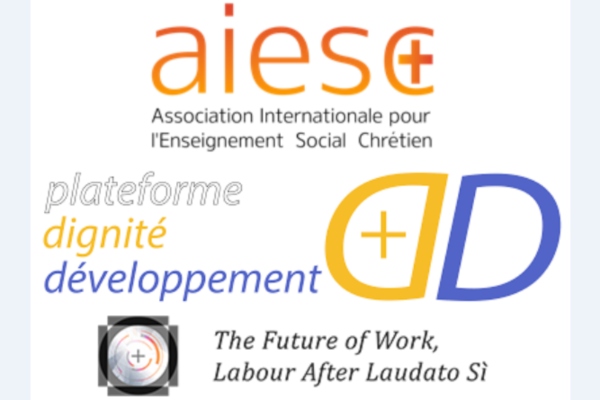Non-wage labour or the invisible labour: social, economic and theological perspectives (11 April 2019, Global)

Non-wage labour or the invisible labour: social, economic and theological perspectives
Call for papers and workshops
The context
In 2019, the ILO is commemorating its first century. The very ILO is an outcome of the peace conference conveyed in Versailles to end the First World War The issue of labour reached then the top of the international agenda because of the outburst of the communist revolution in Russia which ideas were threatening to contaminate the whole of the Western world, with the industrial proletariat as playground.
One hundred years later, and after half a century of globalisation and financiarisation, despite a radical change in context the labour question – broadly understood – remains as urgent as it was one hundred years ago. This is exactly the main message of the report Work for a brighter future produced by an independent commission, Global Commission on the Future of Work under the auspices of the ILO. This landmark report, published in January 2019, the long series of centenary celebrations has launched, with is conferences and debates all around the world.
The universities of Fribourg and of Geneva are contributing to this centenary by organising in autumn 2019 a series of events in co-operation with the ILO. The conference which will take place in Fribourg 30 and 31 of August 2019, belongs to this series.
Thematic axes of the Conference
- Nota Bene: the Fribourg Conference is not only a scholarly gathering, it is naturally concerned with sharing the experiences and lived stories of organizations (private and public) and people directly involved with the wold of work.
Wage earning employment – employment in the classical sense – is still the implicit, quasi-automatic reference to any discourse on labour issues. This is also true for much work carried out by the ILO itself, especially in the field of statistics; it is dominant in the field of the economic analysis of labour market, but the same reference is present in many writings in the field of Christian social teaching. Indeed, wage earning employment is the dominant form of remunerated work in the developed part of the world. However, by no means the same is true in the developing world where prevail – also according to statistics – other forms of non-wage earning labour, often called by default, informal. Non-wage labour is frequent in self-employment, in micro-enterprises, in family care activities and in family farms.
In reality there is an important amount of flux, and not only in terminology, between the classical wage earning contract and the domestic or voluntary work without remuneration. At the global level, according to a statistical estimate – about two thirds of active time of humanity are used to perform work not covered by wage contracts. The long term wage earning contract, is by far not the norm at the world level, while it remains the dominant intellectual reference. To the variety of non-wage forms of work, one has to add what Ivan Illich once called the “hidden work” which corresponds to the time needed by a worker to be ready to work (transport) and the time required to convert his earning into subsistence (shopping).
The Fribourg conference aims at drawing attention to the gap between the still dominant perception of non-wage labour as a pathology that adequate polices can efficiently address, and its prevalence as dominant form of work in developed as well as in developing world. This gap will be addressed from social and economic perspectives, and also from the perspective of social Christian teaching.
Furthermore, the conference will assess the importance of non-wage labour and its contribution to sustain society; it will study the modalities – often non-market ones – rooted in solidarity, reciprocity, generosity or even charity. Even if for some the inclusion of the non-wage labour in national accounts – national product – is the only way to capture its importance, the objections are many and do not relate only to the feasibility aspect. By giving value to what is given for free, one takes the risk of denaturing the very logic of solidarity and gift.
Proposed themes:
- What do we know, also in statistical terms, about the invisible labour, including the informal one;
- Social and economic perspectives on domestic and voluntary work, including care;
- Micro-enterprises in developing and developed world
- The growing weight of “hidden work”
- What the religions have say about the multiplicity of work patterns.
Call for proposals for contributions and workshops:
The ambition of the Conference is to cover the axis mentioned above by combining various methodological approaches: the one of the thinkers and experts with the one of practitioners and actors of social and economic life. The call for proposals therefore goes in a double direction.
- On the one hand, it is intended for various organizations; we invite them to propose workshops of a maximum duration of 1h30. Workshop proposals should contain a brief description of the thematic, a presentation of the proposing/organising organism, and a succinct presentation of the intended speakers as well as the confirmation of their availability.
- On the other hand, this call is addressed to researchers, thinkers and intellectuals willing to share the current state of their research, thinking and projects with the audience and benefit from comments and discussions. These persons are invited to propose an abstract of their paper, and the conclusions they would like to share.
Proposals (in English or French) of two pages maximum, for both workshops and written contributions, must reach the organizers by 1st June 2019. The authors will receive a feed-back form the organizers by 15th June at the latest.
Proposals to be sent to: pawel.dembinski@unifr.ch

